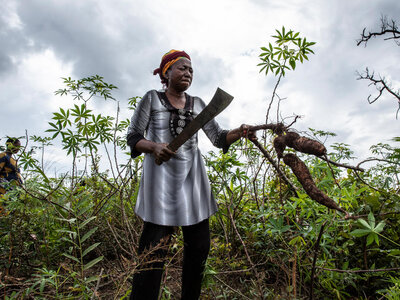Angola
- 1.8 million
- people are food insecure due to the El Niño-induced drought
- 53%
- of the population live on less than US$3.65 per day
- 36.2 million
- population
Located in southwestern Africa, Angola is a lower-middle-income, food-deficit country with a young and rapidly expanding population. More than half of the population live on less than US$3.65 per day. Despite progress in some sectors, Angola ranks 148th out of 193 on the 2025 Human Development Index, highlighting persistent challenges in education, health, and income inequality.
Angola is facing significant economic and climate shocks, threatening both economic growth and food security, with rural communities being the most affected. The country is grappling with a prolonged drought, exacerbated by the El Niño event. This has resulted in below-average harvests, loss of income and assets, and water scarcity. An estimated 2.2 million people are in need of assistance, including 1.8 million who are food insecure and 1.3 million who require nutrition support.
Chronic malnutrition (stunting) affects 40 percent of children aged 6-59 months, while wasting (low height for weight) is at 5 percent. Malnutrition is driven by multiple factors, including limited access to nutritious foods, unsafe drinking water, poor sanitation and hygiene, inadequate infant and child feeding practices, and lack of access to essential services, underscored by poverty.
Harnessing our expertise in emergency response, capacity strengthening and service provision, the World Food Programme (WFP) works with the Government of the Republic of Angola and a broad range of partners to support national development priorities, accelerating progress toward Sustainable Development Goals (SDGs), specifically Goal 2 (Zero Hunger) and Goal 17 (Partnerships for the Goals).
What the World Food Programme is doing in Angola
-
Refugee assistance
-
WFP provides food assistance to 6,300 refugees from the Democratic Republic of the Congo residing in the Lóvua refugee settlement, to help them meet their basic food and nutrition needs. In collaboration with the United Nations Refugee Agency (UNHCR), the Government of Angola and other partners, WFP is also implementing resilience and livelihood support activities, reaching 1,200 refugees and host community members through the distribution of start-up kits as well as the provision of equipment and training on income-generating activities such as agriculture, beekeeping and fruit-tree planting. WFP plans to introduce other high-value production systems, such as fish farming, to help communities diversify their livelihoods, boost their income, strengthen their self-reliance and foster social cohesion.
-
Commodity vouchers
-
Nutrition
-
School meals
-
Technical assistance
-
Service provision
Partners and Donors
Find out more about the state of food security in Angola
Visit the food security analysis pageContacts
Office
Condomínio Rosalinda, Edifício da ONU, 5º andar, Estrada Direita da Samba
Luanda
Angola







